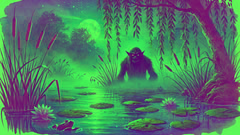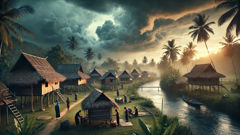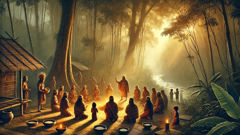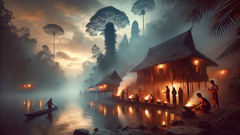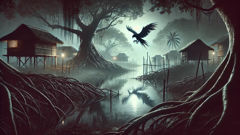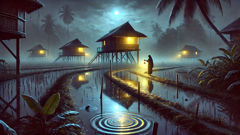Introduction
There’s an old superstition whispered among the reeds and rustling willows that skirt the tranquil ponds of southern Bohemia. On moonless nights, when mist curls like pale fingers across the water and the frogs fall silent, villagers swear they glimpse something—or someone—moving just beneath the lily pads. It’s said that the Vodník, the water goblin of Czech legend, waits patiently in these hidden corners of the land, green-skinned and web-fingered, his red eyes glinting from the shadows. No ordinary trickster or sprite, the Vodník is a collector of souls: those of the drowned, the lost, the unwary. He keeps them in delicate porcelain cups on shelves beneath the pond’s surface, each soul a silent prisoner to his eternal loneliness. For centuries, he’s been both a warning and a fascination, woven into lullabies and midnight tales, blamed for every tragic accident near water. But beneath the old stories are deeper truths, stitched into the very soil and water of Bohemia—a place where the old gods never quite died, and nature’s wild magic still waits just beyond the edge of human sight. Our story begins on a sun-dappled morning in the village of Hrádecek, where a young woman named Lída, restless with dreams and questions, will soon discover the world below the water is far stranger and more dangerous than she ever imagined. Her journey will carry her into the heart of the Vodník’s domain, where courage, grief, and ancient bargains echo like ripples across a pond.
I. Whispers on the Pond
In the village of Hrádecek, mornings began with the cries of crows and the lowing of cattle, but as the sun crested the rim of the forest, its rays struck the pond’s glassy surface and turned it to molten gold. For as long as anyone could remember, the pond had been both a source of life and a shadow of unease. Its waters provided fish, reeds for weaving, and cool respite from summer’s heat, but the villagers never lingered after dusk. Children were warned away with stern voices and old rhymes: 'Vodník waits for careless feet. Step too close—your soul he’ll keep.'
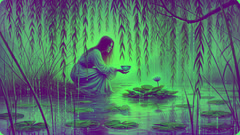
Lída grew up with these warnings, but she was never content with fear. The daughter of a miller and a seamstress, she’d always been restless, her mind as quick as her fingers on the spindle. She’d listen to her grandmother’s tales of water sprites and spirits with fascination, not terror, and would sit by the pond’s edge on bright afternoons, sketching the swirl of tadpoles and the way sunlight danced through the willows. Her father shook his head at her curiosity, but her mother—who had lost two brothers to the pond’s black depths—kept a worried eye on her. The Vodník, she insisted, was real. She told Lída of green men seen on misty mornings, of hollow laughter echoing across the water, of girls with hair like riverweed never seen again.
It was after one such story, told in hushed tones beside the fire, that Lída resolved to see for herself. She waited for the next morning, when dew still clung to the grass and her parents slept. With a journal in one hand and a slice of bread in the other, she crept to the pond, settling beneath her favorite willow. There she watched dragonflies skitter, their wings catching fire in the sun. The world felt safe, beautiful, ordinary. But as she bent to refill her inkwell, a cold ripple brushed her bare toes. She looked up—and saw, reflected in the water, a pale face just beneath the surface. The features were distorted but unmistakably human, rimmed with greenish hair and wide, searching eyes. Lída’s breath caught. The face blinked once, twice, and then sank away with barely a ripple.
She ran home, heart thundering, but said nothing. Days passed in a fog. Was it imagination, a trick of sunlight and fear? But the memory persisted, whispering in her dreams. The village gossiped about a boy gone missing—a shepherd’s son last seen near the pond. Lída’s mother wept for the family, for old grief rekindled. The priest prayed and cast holy water into the reeds, but the villagers knew better than to think prayers could bind what lived in those depths.
On the seventh night after the boy’s disappearance, a storm lashed the village. Lída tossed in her bed, listening to the wind thrash the shutters. Then she heard it—a faint, musical chiming, like porcelain clinking together. It came from the direction of the pond. Unable to bear her curiosity, she wrapped herself in a shawl and slipped outside. Rain pattered on her shoulders as she made her way through the village lanes, past shuttered windows and silent doors. The path to the pond was slick and treacherous. Willows whipped at her face; frogs leapt from her path. At the water’s edge, she paused. The pond was alive with movement—ripples spreading in ever-widening circles. And there, half-submerged beneath the largest lily pad, was the Vodník.
He was smaller than she’d imagined, no taller than a child, but his limbs were long and jointed oddly. His skin gleamed emerald in the stormlight, and his eyes glowed like garnets. Around his neck hung a necklace of tiny keys, each one different. In his hands he cradled a porcelain cup, painted with blue flowers. Within it, a pale light flickered—fading, fluttering, like a moth caught in glass.
Lída’s fear warred with fascination. The Vodník sang softly, a lullaby in a tongue she didn’t know. As she watched, he placed the cup on a shelf woven from reeds beneath the water, beside dozens of others. Each held a light of its own. As dawn broke and the storm faded, the Vodník glanced up. Their eyes met. For a heartbeat, Lída saw something ancient in his gaze—loneliness, perhaps, or hunger. Then he was gone, slipping into the pond’s heart, leaving only ripples behind.
II. The Bargain Below
Lída’s world shifted after that night. She wandered through her days distracted, haunted by visions of porcelain cups and ghostly lights. Every time she closed her eyes, she heard the faint clinking of china and saw the Vodník’s sorrowful eyes. She tried to speak to her grandmother about what she’d witnessed, but the old woman only crossed herself and warned her never to return to the pond alone. Yet, the more Lída was told to avoid it, the more she felt drawn there.
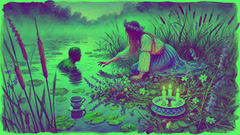
A week later, as the festival of St. John approached—a time when villagers hung garlands on their doors to keep spirits at bay—Lída made her decision. She returned to the pond, this time in broad daylight. The water was calm and glassy. She brought with her an offering: a spool of blue thread, a tiny carved wooden bird, and a handful of wildflowers. She knelt at the water’s edge, placed her gifts on a flat stone, and spoke softly, hoping the Vodník would hear.
At first, there was only silence. But as shadows lengthened, bubbles surfaced near her feet. Then, in a swirl of waterweed and silt, the Vodník appeared. He watched her with wary curiosity. Up close, he looked both young and impossibly old—his skin translucent where it stretched over knobby bones, his hair tangled with bits of moss. Lída summoned her courage.
“I saw you the night the storm took the boy,” she said. “I saw your cups. Are those his soul? The others—are they all trapped too?”
The Vodník tilted his head, his lips curling in a slow, almost-smile. His voice was soft, sibilant, echoing as if from underwater. “Souls find me. Some fall. Some wander. I keep them safe. Lonely things shouldn’t wander long.”
Lída’s heart ached at his words. “But they don’t belong to you. They have families—lives to return to. Let them go.”
He traced a finger along the rim of a cup he produced from nowhere, considering. “Would you give up what keeps you company? Would you live alone forever?”
They bargained as dusk settled. The Vodník listened as Lída pleaded for the shepherd boy’s soul. In exchange, he asked for a memory—a true one, precious and painful. Lída offered him the memory of her brother’s laughter, lost to illness years before. As the Vodník drank in the memory, a faint blue light flickered in his hands and vanished. He handed her the porcelain cup with the boy’s soul. “Return this before dawn,” he warned. “Or it’s lost forever.”
Lída sprinted to the shepherd’s cottage. She poured the light into the boy’s lips as his mother wept. He stirred—dazed, feverish, but alive. News spread through the village by sunrise. Some called it a miracle; others muttered that Lída had trafficked with dark things.
But Lída knew what she’d seen. She returned to the pond, night after night, negotiating for other souls. Each bargain cost her: a favorite childhood song, the scent of her mother’s bread, the warmth of her father’s embrace. Her heart grew heavier with every exchange. The Vodník, for his part, grew livelier—his eyes less hollow, his laughter more frequent. Still, he clung to his collection. Some souls, he claimed, would never leave; others he released with reluctance.
It became clear that he was not merely a monster, but a creature shaped by solitude and sorrow, by centuries of being othered and feared. Yet, no matter how many souls Lída freed, there were always more cups on his shelves—some so old their lights had faded to mere embers.
III. Beneath the Surface
One moonless night, as summer waned and the air thickened with the scent of damp earth, Lída returned to the pond with a single goal: to understand what bound the Vodník to his watery prison and what bound the souls to him. She slipped from her bed and padded through the sleeping village, guided by an unspoken summons.
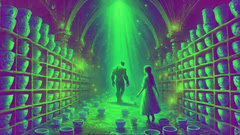
As she reached the water’s edge, she found the Vodník waiting. He seemed expectant, the keys at his throat gleaming in the starlight. Without a word, he beckoned her closer. Lída hesitated only a moment before wading into the shallows. The water was cold and heavy; lilies brushed her ankles as she sank deeper. The Vodník took her hand—his touch was clammy but gentle—and pulled her beneath.
The world transformed. Light filtered down in wavering ribbons; shadows shifted in impossible shapes. Lída found herself standing on a bed of silt and pebbles, breathing as easily as if she were on land. All around her, porcelain shelves rose like cathedral arches. Hundreds of cups lined their surfaces, each one painted with intricate patterns—roses, birds, stars, and scenes of old villages. Within each cup floated a flickering soul, pale and silent.
The Vodník led her through his underwater realm. He showed her how he found lost souls drifting near death—how he gathered them with care and placed them in cups to keep them safe from forgetting. He explained that some souls were drawn to him by despair or longing; others were snatched by accident or mischief. Few ever left willingly.
He showed her his own cup—a great, cracked vessel at the center of his collection. Inside burned a flame both bright and sorrowful. 'I was once human,' he confessed, 'a boy who drowned long ago. I lingered here until I became what you see. Loneliness made me gather others.'
Lída listened, her sympathy growing. She realized that freeing the souls was not just about undoing curses or bargains—it was about mending something broken in the Vodník himself. She asked what would happen if his own cup were healed.
He shuddered. 'I would be free to leave this place—but so would all the souls. They’d return to the world or move beyond.'
Determined, Lída sought a way to mend his cup. She remembered her grandmother’s stories of old magic—how true love or sacrifice could mend even the deepest wounds. She offered her own soul in exchange for his freedom and the release of all the souls trapped beneath the pond.
The Vodník wept then, silent tears lost to the water. He refused to take her soul, but her willingness sparked something within him. Light flared through his shelves, cups trembling. The crack in his vessel shimmered and began to knit itself together.
As dawn crept across the sky above, Lída felt herself rising from the pond, buoyed by a thousand silent voices. She surfaced alone. The Vodník was gone; his shelves empty. The pond glowed with morning light—peaceful, whole.
Lída stumbled home, changed. From that day forward, no one drowned in the village pond. The reeds grew thick and green; fish returned in abundance. Villagers lost their fear and learned to respect—not dread—the waters that sustained them. Lída never forgot the Vodník or the bargain they’d made, nor did she ever lose the sense of wonder that came from glimpsing the world beneath the lily pads.
Conclusion
The tale of Lída and the Vodník lived on in Hrádecek for generations. Children played by the pond without fear, but they were taught to treat the waters with reverence—leaving wildflowers for the spirits and singing songs of gratitude. Lída herself became something of a legend: a woman who’d bargained with a goblin and returned with hope instead of despair. She grew older, her hair silvering like pond mist, but her eyes always shone with the secrets she carried. Some whispered that she still visited the pond on quiet mornings, speaking softly to the lilies and listening for laughter beneath the surface. And sometimes, when the mist curled low and the sun caught the water just so, those who believed claimed they saw a ripple—a flash of green—a reminder that every pond holds stories as deep and wild as the hearts of those who dare to listen. In this way, the Vodník was never truly gone. He lived on in memory and mystery, a guardian not only of lost souls but of the fragile bond between people and the natural world. The pond endured: sometimes mirror-still, sometimes shivering with secret life. And always, beneath its calm surface, echoes lingered—of bargains made and kept, of sorrows healed and forgiven, and of the beauty found in facing what we fear most.

